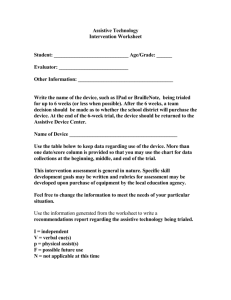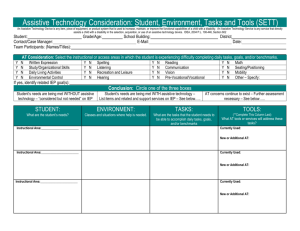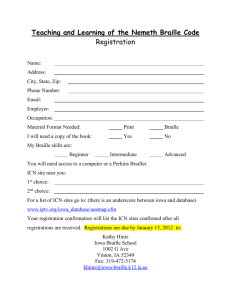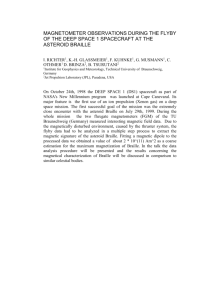WHO Priority Assistive Products List (APL) Global
advertisement
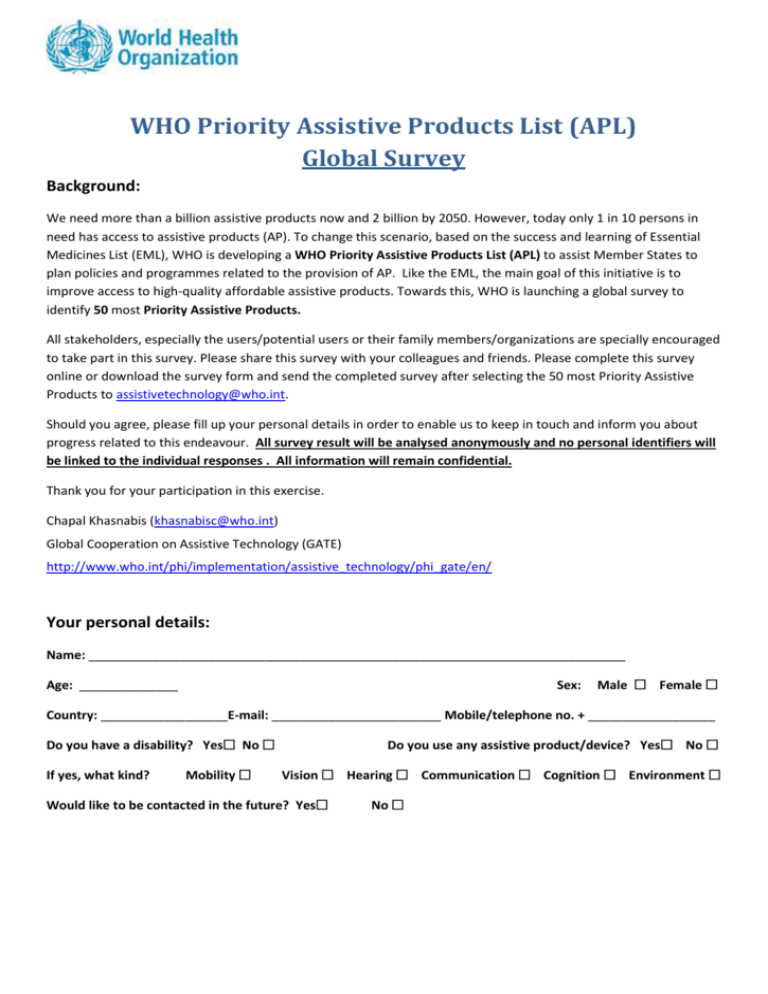
WHO Priority Assistive Products List (APL) Global Survey Background: We need more than a billion assistive products now and 2 billion by 2050. However, today only 1 in 10 persons in need has access to assistive products (AP). To change this scenario, based on the success and learning of Essential Medicines List (EML), WHO is developing a WHO Priority Assistive Products List (APL) to assist Member States to plan policies and programmes related to the provision of AP. Like the EML, the main goal of this initiative is to improve access to high-quality affordable assistive products. Towards this, WHO is launching a global survey to identify 50 most Priority Assistive Products. All stakeholders, especially the users/potential users or their family members/organizations are specially encouraged to take part in this survey. Please share this survey with your colleagues and friends. Please complete this survey online or download the survey form and send the completed survey after selecting the 50 most Priority Assistive Products to assistivetechnology@who.int. Should you agree, please fill up your personal details in order to enable us to keep in touch and inform you about progress related to this endeavour. All survey result will be analysed anonymously and no personal identifiers will be linked to the individual responses . All information will remain confidential. Thank you for your participation in this exercise. Chapal Khasnabis (khasnabisc@who.int) Global Cooperation on Assistive Technology (GATE) http://www.who.int/phi/implementation/assistive_technology/phi_gate/en/ Your personal details: Name: ____________________________________________________________________________ Age: ______________ Sex: Male Female Country: __________________E-mail: ________________________ Mobile/telephone no. + __________________ Do you have a disability? Yes No If yes, what kind? Mobility Do you use any assistive product/device? Yes No Vision Hearing Communication Cognition Environment Would like to be contacted in the future? Yes No 1. Mobility Name of Product (ISO Code) Area Axillary crutches 12.03.12 Devices providing support when walking that have a horizontal padded support that is placed against the upper body next to the armpit ☐ 2 Elbow crutches 12.03.06 Devices, adjustable in height, providing support when walking that have a semi-circular support for the elbow, a horizontal hand grip, a single shaft, and one tip ☐ 3 Walking sticks/canes 12.03.03 Adjustable/non-adjustable mobility device with a handgrip ☐ 4 Tripod/Quadripod sticks 12.03.16 Device providing support when walking that has a single shaft that branches into three or four shafts, each of which ends with a non-slip tip (ferrule) ☐ 5 Walking frames 12.06.03 Frame that helps a person to maintain stability and balance while walking or standing, with either four tips (ferrules) or two tips and two castors ☐ 6 Rollators 12.06.06 Frame that help a person to maintain stability and balance while walking, that has hand grips and three or more wheels (with or without a platform) ☐ Manual wheelchairs – basic type for active users 12.22.03 Intended to be self-propelled by the users by pushing rims or wheels. Can be used indoor/outdoor and on various types of terrain. ☐ Manual wheelchairs push type Only for indoor use and limited outdoors, pushed by an attendent ☐ Manual wheelchairs – intermediate/advanced type 12.22.03 Manual wheelchairs with postural support that can be adjusted to the individual user’s needs ☐ 10 Sports wheelchairs 12.22.03 Light-weight wheelchairs for sports. ☐ 11 Electrical wheelchairs 12.23.06 Wheelchair powered by battery ☐ 12 Electrical wheelchairs with postural support 12.23.06 Wheelchairs with postural support powered by battery ☐ 13 Tricycles (three-wheeled cycles) 12.18.09 Trikes or three-wheeled cycles for greater mobility and mostly for outdoor use ☐ 14 Foot Orthoses (FO) 06.12.03 Orthosis that encompass the whole or part of the foot. Included are, e.g.: insoles and shoe inserts, pads, arch supports, heel cushions ☐ 15 Footwear for diabetes/neuropathic foot 06.33.30 Orthopaedic shoes to reduce or distribute load on tissue to prevent injuries in the development of a diabetic foot ☐ Walkers 7 8 9 Wheelchairs Lower limb orthoses Explanation 1 Crutches Walking sticks and canes √Tick maximum 16 products which you consider important 16 Orthopaedic shoes or footwear 06.33.30 Footwear intended to treat or compensate for the impaired body functions or body structures of a person's leg, ankle and foot ☐ 17 Foot abduction braces/ Club foot braces/splints Device used in the treatment of club foot ☐ Ankle Foot Orthoses (calliper/brace) (AFO) 06.12.06 Orthosis that encompasses the ankle joint and the whole or part of the foot ☐ Knee orthoses (calliper/brace) (KO) 06.12.09 Orthosis that encompasses/supports the knee joint ☐ Knee ankle foot orthoses (calliper/brace) (KAFO) 06.12.12 Orthosis that encompasses the knee and ankle joints and the foot ☐ Hand splints (cockup/wrist immobilizer) 06.06.12 Used to stabilize (immobilize) the wrist and hand in the desired position to rest the joint, tendons, ligaments or maintain a certain bone alignment ☐ Static wrist-hand orthoses (WHO) /splints 06.06.12 Orthosis that encompasses the wrist joint and the hand to maintain functional position of the hand and prevent wrist and hand deformities ☐ Shoulder slings A sling is a bandage used to support an injured arm ☐ Thoraco-lumbo-sacral orthoses/brace 06.03.09 Orthosis that encompasses the whole or part of the thoracic, lumbar and sacro-iliac regions of the trunk ☐ Cervical orthoses 06.03.12 Orthosis that supports the whole or part of the cervical spine ☐ 18 19 20 21 Upper limb orthoses 22 23 24 Spinal orthoses 25 26 Below knee lower limb prosthesis (artificial leg) 06.24.09 Lower limb prostheses 27 28 Upper limb prostheses 29 Special devices for children with developmental delays 30 31 Above knee lower limb prosthesis (artificial leg) 06.24.15 Trans-humeral (above elbow) upper limb prosthesis (artificial hand) 06.18.15 Trans-radial (below elbow) upper limb prosthesis (artificial hand) 06.18.09 Adjustable walkers for children Device that replaces part of the lower limb between the knee joint and the ankle joint after amputation or in cases of limb deficiency (includes trans-tibial, foot prosthesis and partial foot prosthesis) Device that replaces part of the lower limb between the hip joint and the knee joint after amputation or in cases of limb deficiency (includes trans-femoral, knee disarticulation and hip disarticulation prosthesis) ☐ ☐ Device that replaces part of the upper limb between the shoulder and elbow joints after amputation or in cases of limb deficiency ☐ Device that replaces part of the upper limb between the wrist and elbow joints after amputation or in cases of limb deficiency ☐ Assists children with any kind of developmental delays to walk ☐ Specially designed seat and desk for children with Table/seating frames any kind of developmental delay for seating and standing ☐ 32 Adjustable standing frames 04.48.08 Standing frame that provides angle adjustable supine and prone full body support option for children with range of mobility and developmental delay 2. Vision Name of Product (ISO Code) Area Spectacles Magnifying devices Tactile sticks √Tick maximum 9 products which you consider important Explanation 33 Spectacles for short distance/Reading glasses 22.03.06 Eyeglasses that help correct close-range vision issues for selected fixed power range ☐ 34 Spectacles for long distance 22.03.06 Distance glasses focus on things that are further away in positive selected power grades ☐ 35 Eyeglasses for low vision 22.03.06 Special glasses for Gross magnification (of selected positive power) ☐ 36 Magnifying glasses 22.03.09 convex lens that is used to produce a magnified image of an object ☐ 37 Hand-held digital magnifiers 22.03.18 portable systems that display an enlarged image of a close object captured by a video camera ☐ 38 Pc Magnifiers Magnification and screen reading software for the visually impaired and helps countless individuals Some features Color Enhancement Transition Effects- Smooth Mouse Pointers ☐ 39 White canes (folding or non-folding) 12.39.03 Devices for navigation or identification of the surroundings used by a person with a visual impairment ☐ 40 Refreshable braille displays 22.39.05 Electro-mechanical device for displaying braille characters, usually by means of round-tipped pins raised through holes in a flat surface ☐ 41 Text to speech software Software that reads selected text ☐ 42 Screen readers 22.39.12 Software that interprets what is being displayed on the screen and presents it to the user with textto-speech, sound icons, or a Braille output ☐ 43 Screen Reader for Smart Phone/tablet Communication device with screen reading software also used for reading books and newspaper and also for GPS based navigation. ☐ 44 Portable braille note takers 22.12.21 Portable devices that use either a Braille or keyboard for input and voice and/or refreshable Braille for output ☐ 45 Braille Printers Printer that generates Braille embossed paper documents ☐ 46 Braille writing equipment 22.12.12 Devices for manual Braille input entry for producing Braille onto paper ☐ Interactive products Products for writing ☐ 47 Braille translation software 22.39.12 Braille translation software converts electronic files into Braille ☐ 48 Automatic Speech Recognition software Software for transcription of spoken language into readable text on a screen in real time ☐ 49 Talking calculators 22.15.06 Calculating device that presents calculations in sounds ☐ 50 Talking/touching watches 22.27.12 Timekeeping device that presents the time as sounds ☐ Talking devices 3. Hearing Name of Product (ISO Code) Area Signalling products Explanation 51 Body worn hearing aids 22.06.06 Device worn attached to the person's clothes or hanging around her/his neck that amplifies sound ☐ 52 Behind the ear hearing aids 22.06.15 Devices worn behind the ear to amplify sound. ☐ 53 In the ear or in the canal hearing aids 22.06.12 Partial or completely in the canal. Devices worn in the ear or in the year canal to amplify sound. ☐ 54 Hearing aid rechargeable batteries and chargers Devices to re-charge hearing aid batteries using electric/solar power ☐ 55 Amplified telephones 22.24.03 Type of telephone that is designed to amplify sound for people with a hearing impairment ☐ 56 Video communication devices Device that allows for interaction achieved by means of a video link ☐ 57 Text to Text Communication Device Wired/wireless (often battery operated) real time text-to-text communication among 2 - 4 people ☐ 58 Device/software for gesture to voice technologies Sign language is converted into speech and speech into text or sign language ☐ 59 DeafBlind Communicator (DBC) Consists of a Braille note-taker linked by Bluetooth to a mobile phone ☐ 60 Doorbell indicators 22.27.03 Flashing device activated when doorbell rings ☐ Hearing aids Communication products √Tick maximum 7 products which you consider important 61 Fire and smoke alarm signallers 22.27.09 Flashing strobe light and/or a vibrating pad that can be placed under the pillow which activate when the smoke alarm sounds ☐ 62 Vibrating multi-sound wrist bracelets 22.27.09 Notifies user with vibrations when different sounds are detected (e.g. telephone, doorbell, baby-cry, etc.) ☐ 63 Captioning TVs 22.18.21 Audio portion of the television program is converted into written words, which appear in a window on the screen. ☐ 64 Automatic speech recognition in captioning systems Auditory information picked-up by an ASR is translated into text and displayed for the deaf user ☐ Other products 4. Communication Name of Product (ISO Code) Area Nonelectronic AAC Electronic AAC Accessories √Tick maximum 4 products which you consider important Explanation 65 Communication boards/books 22.21.03 Communication displays consisting of photographs, symbols, words/letters or a combination of all three ☐ 66 Communication cards 22.21.03 Users point to the picture representing need or exchange picture for object depicted ☐ 67 Face-to-face communication software 22.21.12 Software for direct communication - based on symbols or text - which supplements or replaces speech or verbal communication ☐ 68 Symbols generating software Enables the creation of individualised low/no technology communication tools (i.e. communication boards/books/cards) ☐ 69 AAC apps Augmentative and Alternative Communication (AAC) application for SMART phones to facilitate communication ☐ 70 Head mouse Helps paralyzed people interact with computers, using head movements to perform common operations such as typing, copying and pasting ☐ 71 Head-mouth sticks 24.18.15 Accessory mounted to the head or mouth used as a keyboard aid, a pencil holder, accessing a communication board or for turning pages ☐ 72 Keyboard and mouse emulation software 22.36.18 Software that reproduces the keyboard on the device screen and/or allows control of mouse pointer movement and/or click functions. ☐ 5. Cognition Name of Product (ISO Code) Area Multiple uses Memory Aids Time devices Locator devices Explanation 73 Personal Digital Assistants (PDA) 22.33.06 Computers that can be powered with batteries and thus can be used anywhere - includes mobile phones such as smartphones and tablets ☐ 74 Recorders (Dictaphone) 22.18.08 Portable devices that can record, store, and replay audible information to facilitate the recall of facts or appointments ☐ 75 Watch with preprogrammed task reminders Watch that can be programmed by user or by carers with audible alarms or text messages that bring the user attention to a task ☐ 76 Pill organizers 04.19.04 Special container for storing scheduled doses of one's medications to keep track of whether or not the user has taken the medication ☐ 77 Visual timers Operated by the user or support person to enable the user to stay on task, complete task on time, wait without anxiety among many other uses ☐ 78 Time orientation products Products that support orientation in time (year, season, month, date, weekday, part of day, clocktime). ☐ 79 Time management products 22.27.15 Products that support ordering events in chronological sequence and allocating amounts of time to events and activities. ☐ 80 Portable GPS trackers Small portable GPS devices that come in different shapes and sizes and are powered by batteries ☐ 81 GPS locator watch/locator GPS tracking device integrated in watch or in another object that can be carried ☐ 82 Item locators Devices that can help locate commonly mislaid items in the home such as keys, wallets, glasses case etc. or warn user when any tagged items have wandered outside of a user-set boundary ☐ 83 Portable navigation aids 12.39.06 Product that supports users to walk from one location to another ☐ ☐ Navigation devices Communication and language tools √Tick maximum 9 products which you consider important 84 Portable travel aids Product that supports user to travel from one location to another, with route data and information on public transportation services, payments and outdoor navigation 85 Simplified mobile phones Easy to use mobile phones i.e. easy interface, big buttons for facilitating calling or texting, etc. ☐ 86 Word completion programs 22.12.24 Programs that predict whole words on the basis of the first few letters typed by the user ☐ 87 Picture based navigation software 88 Personal emergency alarm systems 22.27.18 Alarms 89 90 Fall detectors Medical Alert ID Takes through pre-programmed daily-living tasks, step-by-step using pictures for each step Device either operated by the user or activated automatically in case of personal emergency to notify the user or obtain help from another individual or service Fall detectors are worn by the person and will trigger an alert to a carer if an impact is detected and/or the person remains in a lying position. The device then sends an alarm signal to a carer or monitoring centre Smart ID allows for communication of medical conditions and emergency contact information 6. Environment Name of Product (ISO Code) Area Handrails and grab bars Assistive products for washing Assistive products for toileting Beds Wheelchair accessories ☐ ☐ ☐ ☐ √Tick maximum 5 products which you consider important Explanation 91 Handrails and support rails 18.18.03 Bars, usually cylindrical, attached to a wall, floor or other stable structure that provide the means for a person to support or stabilize himself ☐ 92 Grab bars and handgrips (fixed or removable) 18.18.06 / 18.18.10 Straight or angled bars that provide support to a person while changing position, standing or walking ☐ 93 Shower chairs 09.33.03 Waterproof chair/stool with or without castors that support seating in the shower. It may include armrests, adjustable height legs, and reclining facilities. ☐ 94 Bath/shower seats 09.33.03 Devices for supporting sitting during bathing or showering ☐ 95 Toilet seat raisers 09.12.15 Raised toilet seats that can easily be removed from the WC pan ☐ 96 Commode chairs 09.12.03 Chairs, with or without castors, with a built-in collection receptacle used for toileting away from the bathroom ☐ 97 Pressure relief mattress 04 33 06 prevent pressure injuries by dispersing pressure away from bone protrusions ☐ 98 Pressure relief cushions 04.33.03 Device for tissue integrity through redistribution of the load on the buttocks ☐ 99 Portable ramps 18.30.15 Moveable sloping surfaces that bridge a limited gap between two levels ☐ 100 Sliding boards, sliding mats and turning sheets 12.31.03 Devices for changing position or direction of a person sitting or lying, using sliding techniques. ☐
